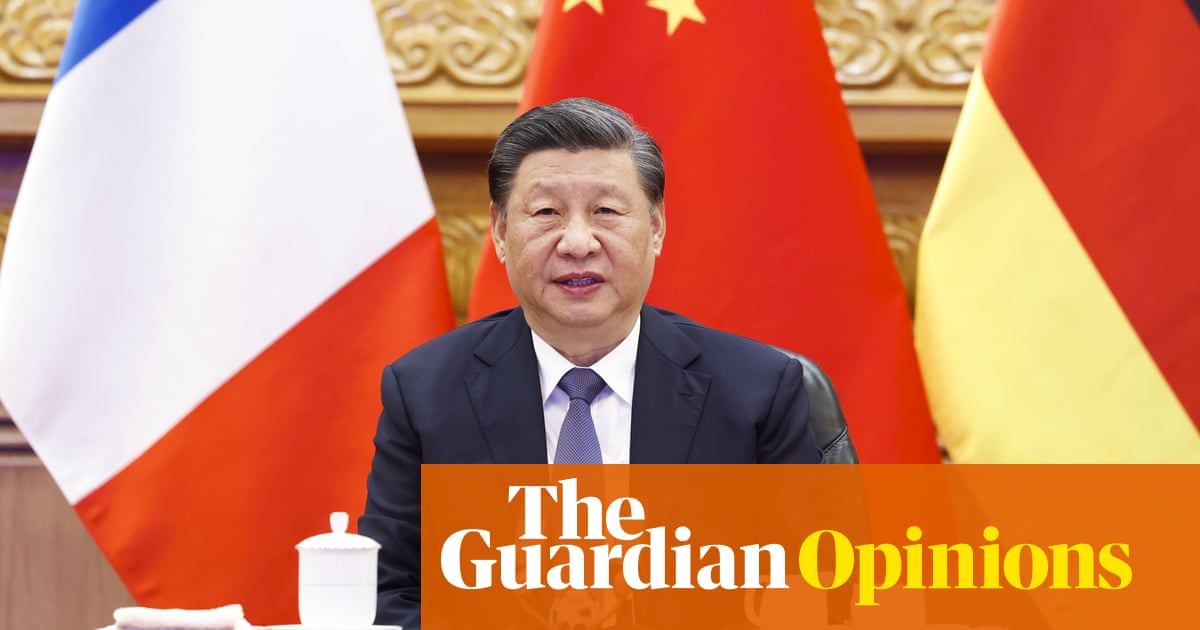The Guardian view on China and Russia: enough in common
Show caption The Chinese president, Xi Jinping, attending a video summit with the French president, Emmanuel Macron, and German chancellor, Olaf Scholz. Photograph: Xinhua/REX/Shutterstock Opinion The Guardian view on China and Russia: enough in common Editorial The invasion of Ukraine puts Beijing in an uncomfortable position. That doesn’t mean it will distance itself from Moscow Tue 8 Mar 2022 18.40 GMT Share on Facebook
Share on Twitter
Share via Email
Can China play peacemaker? That is the faint hope now being seized upon by western leaders desperate to end the bloodshed in Ukraine. “It has to be China,” said Josep Borrell, the EU foreign policy chief. Ukraine’s foreign minister, Dmytro Kuleba, has said that “China is interested in stopping this war”. On Tuesday, Xi Jinping made his strongest statement on the war yet as the French president and German chancellor met him virtually, calling for “maximum restraint” and saying that China was “pained to see the flames of war reignited in Europe”.
What he did not do was call it an invasion or blame Russia. The bilateral relationship is at its closest for seven decades, since the Sino-Soviet split. Weeks before the invasion, the two presidents declared that it had “no limits” as Vladimir Putin visited Beijing for the Winter Olympics – the only major leader to do so amid a western diplomatic boycott. China has denounced reports that it asked Russia not to invade during the Games as US disinformation. Even if Mr Xi knew that his counterpart planned a full-scale invasion across Ukraine, he surely failed to anticipate the strength of resistance and the scale of the international backlash. But his personal investment in the partnership makes it extremely hard to correct course.
European attempts to position China as a mediator reflect the lack of other options, but also the understanding that it is attempting to reconcile three irreconcilable elements: its closeness to Russia; its long-declared belief in territorial integrity, national sovereignty and non-interference; and its need to minimise the fallout it experiences from the sanctions on Moscow. This, rather than fundamental shifts in its position, explains confused messaging since 24 February, and China’s decision to abstain rather than vote with Russia on key UN resolutions.
The bilateral relationship is one of convenience, not love. The countries have been adversaries as well as partners in the past. Mr Xi and Mr Putin are alike in pursuing repression at home and a more aggressive policy abroad, and buttressing their regimes with a narrative of their nation’s historical greatness. Above all, they are brought together by their belief that the US – and the west more broadly – is the major threat that they face. China may not have welcomed the invasion – but it has repeatedly blamed the US and Nato encroachment for the crisis, described Washington’s Indo-Pacific strategy as an attempt to create a regional version of Nato, and denounced “illegal” sanctions on Russia. The foreign ministry has amplified ludicrous claims made in Moscow’s disinformation campaign.
Mr Xi no doubt appreciates that Mr Putin has dragged the Biden administration’s attention away from dealing with China. The new closeness between the US and Europe – including central and eastern European countries that China has been carefully courting – is less welcome. Sino-Russian trade has grown substantially; last year it jumped to a record $146.9bn (£111.9bn). But that is only around half the level of China’s trade with the EU, and a fraction of its trade with the US. It trails strategic objectives.
Vaguely expressed hopes for de-escalation are very different to actions to help achieve it. The suspicion is that remarks suggesting Beijing is open to mediation are designed to soften criticism of its support for Russia, rather than reflecting a shift in its thinking. That at least shows that it knows that it too will pay a price for the invasion, economically and politically – a point that European leaders should reiterate. Though expectations of its ability and willingness to act as go-between should be low, pressing China may dissuade it from doing more to assist Russia, and impose limits on a friendship that is supposed to be without them.
• This article was amended on 9 March 2022. Josep Borrell is the foreign policy chief for the EU, not the UN as stated in an earlier version.











